Mass Effect: Andromeda tips and tricks to get more from the game
Mass Effect: Andromeda is finally here, and overall it's an exciting game.
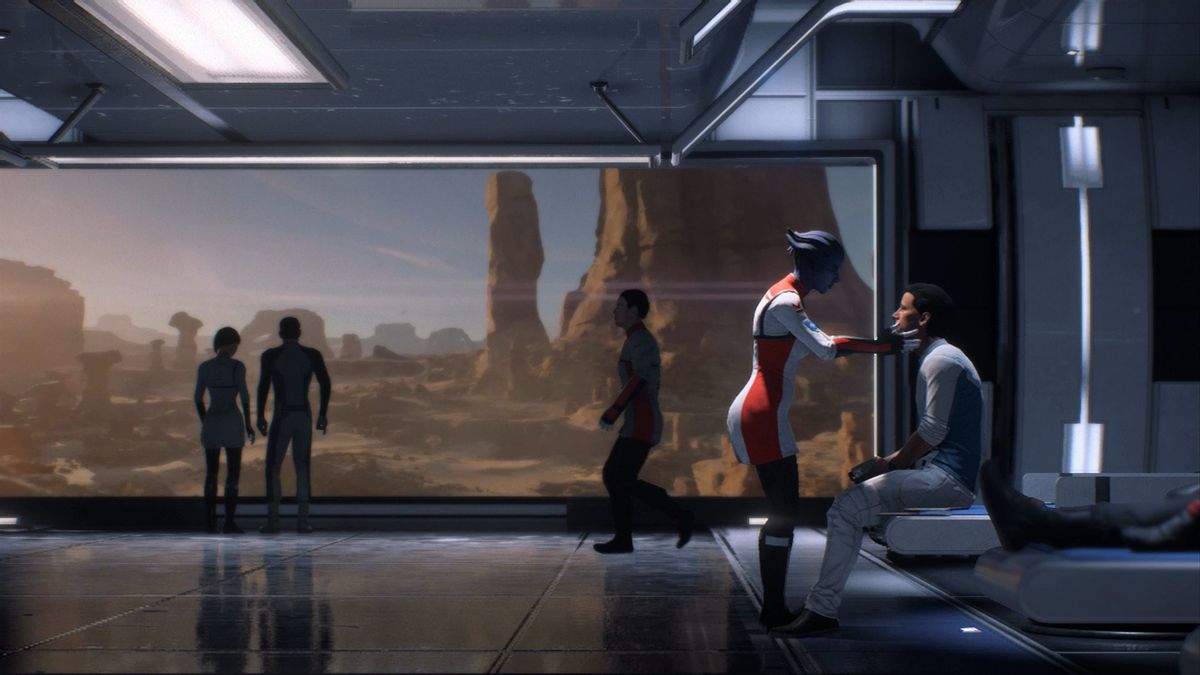
Besides the bugs and the over-reliance on filler side quests, Mass Effect: Andromeda has some of the best combat in the franchise, complete with fun characters, an engaging plot, and a deep multiplayer.
It's also quite different from the previous games, and if you're new to the franchise, you might find yourself wondering where all these strange aliens fit into the game's space age universe.
Here are a few quick tips for Mass Effect: Andromeda newcomers, whether you're new to the franchise or returning after the series' five-year slumber.
- Spoiler free backstory
- Why you should check your connectivity
- Consider changing the difficulty
- Crafting and inventory systems
- You can safely skip side quests
- Choose a playstyle
- Master the Nomad
- Accept Andromeda for what it is
1. Spoiler-free backstory
The first thing newcomers might be wondering is what exactly is going on? Mass Effect: Andromeda sets the tone a little in its opening, but a lot of the nuance is left to the previous trilogy. Here's a quick primer to get you up to speed.

Mass Effect: Andromeda is set in the year 2819, following a 600-year journey in cryo-stasis across dark space from our galaxy to Andromeda. In the twenty-second century, humanity has joined an alliance of alien civilizations, having finally mastered the art of interstellar travel. Using ancient alien technology and a newly discovered mass effecting mineral, known as Element Zero, humanity has spread its civilization across the Milky Way galaxy. Andromeda begins somewhere between the events of Mass Effect 2 and 3, and follows the exploits of the Andromeda Initiative.
The Andromeda Initiative is a strategy formulated by the Milky Way's four most powerful civilizations: humanity; the blue, mono-gendered asari; the amphibian salarians; and the dinosaur-like turians. Each race sends 20,000 volunteers aboard Ark capital ships on a one-way trip across dark space to begin colonizing the Andromeda galaxy. The game references classic explorers and pioneers of old, and it deals with the complexities of founding a new nation.
Get the Windows Central Newsletter
All the latest news, reviews, and guides for Windows and Xbox diehards.

To set up the colonization, the Andromeda Initiative sent thousands of construction workers ahead to build a gigantic space station called the Nexus, to serve as the seat of government for the new civilization. As you might expect, very little goes according to plan.
You don't need any prior knowledge of previous games to play Andromeda, but there are a few subtle nods to previous events throughout the game's missions and locations. The previous Mass Effect games (particularly 2 and 3) hold up very well even in 2017, and they're all available on Xbox One with backwards compatibility, either physically or through EA Access.
2. Check your connectivity for easy resources and multiplayer
At the title screen, you might notice a "connecting" symbol above the start and resume button at the top of the menu. If you don't wait for that to connect, you won't be able to access the APEX missions in the single player game. Why would you want to?
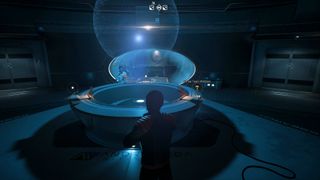
The APEX menu becomes available on your personal ship after the first few quests, and they play our similarly to the NPC missions found in games such as Fallout Shelter and Assassin's Creed Brotherhood. Here, you can recruit teams of NPCs and send them out on various missions, which play out in real time and while you're offline. The rewards include crafting materials, which can be quite hard to come by in-game, particularly if you're planning on focusing your strengths on weapon and melee combat over biotic physics-warping powers.
Mass Effect: Andromeda's multiplayer also provides rewards that can be used in the single player aspects of the game, and it's certainly worth checking out if you were a fan of Mass Effect 3's multiplayer, or Gears of War's Horde mode.
3. Consider changing the difficulty
Before jumping in, you might want to consider changing the difficulty, especially depending on your class and squad mate choices.

Using biotic abilities, which are effectively physics-warping Jedi powers, I found normal difficulty far too easy. Biotics can completely nullify huge fields of enemies, and they have very brief cool downs. Throw down a singularity, toss in a throw, and watch the explosions roll.
As you level up and improve your gear, mods, and begin branching out your skills, many players may find that normal becomes far too easy. If you're a seasoned shooter player, cranking the difficulty up to hardcore should offer more of a challenge — and if it's too much, you can always alter it later in-game.
4. Get acquainted with the crafting and inventory systems
Mass Effect: Andromeda doesn't have the most intuitive crafting and inventory systems out there, so it's a good idea to get acquainted early.
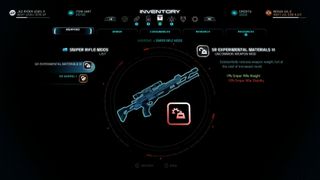
The first thing to note is that you can't change equipment in the field. You will only be able to change your loadout at forward stations (unlockable fast travel points on planets), on your ship, to the left of the galaxy map, and at the start of missions. You can unlock additional equipment slots in the soldier skill tree, too. Here, you can equip consumable items (accessible in combat with the view button on your controller), and weapons, which you can swap by holding the X button.
When it comes to crafting, which Andromeda calls "research and development," it's primarily done on your personal Tempest space ship, in the central room down the main corridor.
Here, you can research new weapons, gear, mods and augmentations, and then use the development menu to craft them.
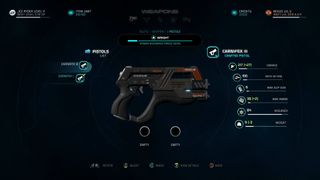
Resources can be quite scarce in Mass Effect: Andromeda, so don't feel like you have to rank up your weapons constantly. I tended to upgrade every three ranks or so, and even then I sometimes struggled with the components.
You might want to save more powerful augments for higher level gear, as the augments will be lost once your item has been crafted.
You can view the stats on any given item and choose the path that suits your playstyle. As a Biotic, I went for the N7 armor, as it came with passive bonuses to Biotic damage and effects. I acquired new ranks using the research menu, then upgraded the pieces using the development menu. Research blueprints require data, which you acquire in the field using the scanner by pressing down on the D-pad. Many items can be scanned, from crashed ships, random tech objects, and alien relics, and the game will usually alert you when there's something worth scanning nearby.
Development requires minerals, which are also acquired in the field, but they can also be harvested from APEX missions or by unlocking certain cryo-stasis pods in the Nexus management section. Other easy ways to acquire materials are to deconstruct useless weapons, scan planets in the galaxy map, or on the ground using the Nomad rover.
When you craft a piece of armor or a weapon, you can use augments to enhance their stats and capabilities. Augments can be crafted but also can be found in loot boxes around the world, or on the corpses of felled enemies. You might want to save more powerful augments for higher level gear, because the augments will be lost once your item has been crafted.

In addition to augmenting crafted gear, you can add mods to them in the loadout menu. Mods allow you to further customize your playstyle, or adjust shortcomings with your current skill set. For example, I want to use sniper rifles, but their weight reduces the speed of my Biotic ability cool downs. I can mitigate this by adding a mod that reduces the weight of my sniper rifle, offsetting the downsides of using it.
There's a huge amount of mods, augments, weapons, and other items you can unlock playing Mass Effect: Andromeda. The best way to learn the game is to simply head out, and see what's out there.
5. You can safely skip side quests
Mass Effect: Andromeda switches to a semi "open world" format, with large planetary surfaces traversable using the Nomad, a six-wheel drive space buggy.
Each map typically comes with a couple of main story quests, either to progress the main plot, or to achieve loyalty status with one of your six squad members. You can review what missions you have available in the menu screen, under the journal tab.

In addition to these main missions, Mass Effect: Andromeda's planets are littered with side quests that appear on the map as exclamation points inside a pentagon. Side missions reward EXP and loot, but unfortunately I haven't encountered a single side mission I would consider "unmissable," both in terms of fun and story.
Basically, if you find yourself getting bored, skip ahead to the next story mission you have. You can always come back to side missions later.
6. Choose a playstyle, and then choose another one
In Mass Effect: Andromeda, you are free to put points in any class you like, which largely follow the archetypes found in the series from previous games. The more points you put in a single class, the more powerful those abilities will become. For example, playing as a Biotic, I ranked up my Adept class several times, providing damage boosts and other perks.
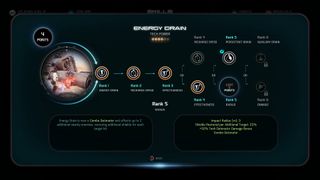
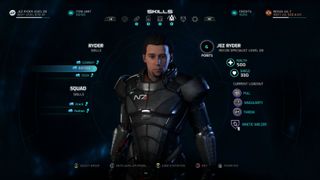
You can re-spec your abilities at any time on the Tempest personal ship, in the medical bay.
However, I also wanted to play with sniper rifles, so I began putting points into the Combat skill tree, lowering the weight of sniper rifles and other weapons. I could also dive into the tech tree, picking up stealth abilities, and other tech powers to aid with circumventing enemy defences.
You can have three active abilities at any one time in Mass Effect: Andromeda, which might seem restrictive considering there are dozens of them. Thankfully, the game allows you to save up to four loadouts of three abilities, which can be swapped on the fly by hitting the view button and then pressing X. It's a little cumbersome, but it allows you to keep things fresh by alternating your playstyle, and also allows you to counter different types of enemies.
You can re-spec your abilities at any time on the Tempest personal ship, in the medical bay.
7. Master the Nomad and open world gameplay
The Nomad is a brand new six-wheel rover designed for traversing Mass Effect: Andromeda's open world areas. You can't use it on every planet in the game, but for the larger areas, it's essential for travelling around the map.
Each map is dotted with forward station points, which are unlocked as you travel near. They allow you to fast travel via the map, and can drastically reduce the amount of tedium when it comes to mopping up fetch quests (of which, there are many).
Despite all the bugs and scanning, every now and then, Mass Effect: Andromeda will take your breath away. pic.twitter.com/8qMlS3qRIy— Jez 🎮🦂 (@JezCorden) March 23, 2017
The Nomad comes with two drive modes. One allows for a faster top speed at the cost of traction, and the other engages six-wheel drive, allowing you to scale steep slopes. Alternate between the two modes to optimize your traversal. You can also use the Nomad's boost to give yourself an extra nudge on prohibitively steep inclines.
The Nomad can be upgraded with various features, such as increased speed, shields, and resistance to outside hazards. You can find upgrades at various vendors scattered throughout the Heleus Cluster, and once purchased, they automatically apply to the Nomad.
8. Accept Andromeda for what it is (or don't)
It's important to set your expectations for what Mass Effect: Andromeda is before jumping in. Long-time fans might find themselves disappointed by the lack of choreographed sequences and missions, and the bugs that plague the game are abundant.

For the ops that are choreographed, such as loyalty missions and major plot points, they offer some great moments that are genuinely moving, goose-bump inducing, and laugh-out-loud funny.
You might want to hold off on purchasing Mass Effect: Andromeda until BioWare can patch some of the immersion-breaking bugs with conversations and poor optimization on Xbox One consoles. There is a true Mass Effect game beneath all the filler and problems, and hey, if you're a fan of open world grinding, you might enjoy every aspect the game has to offer.
Mass Effect: Andromeda isn't a perfect game, but for what it's worth, it sports a ton of content, amazing combat, and a rich multiplayer. If you're willing to look past the issues, or maybe even wait for patches, Andromeda will prove to be a great space RPG shooter.

Jez Corden is the Executive Editor at Windows Central, focusing primarily on all things Xbox and gaming. Jez is known for breaking exclusive news and analysis as relates to the Microsoft ecosystem while being powered by tea. Follow on Twitter (X) and Threads, and listen to his XB2 Podcast, all about, you guessed it, Xbox!